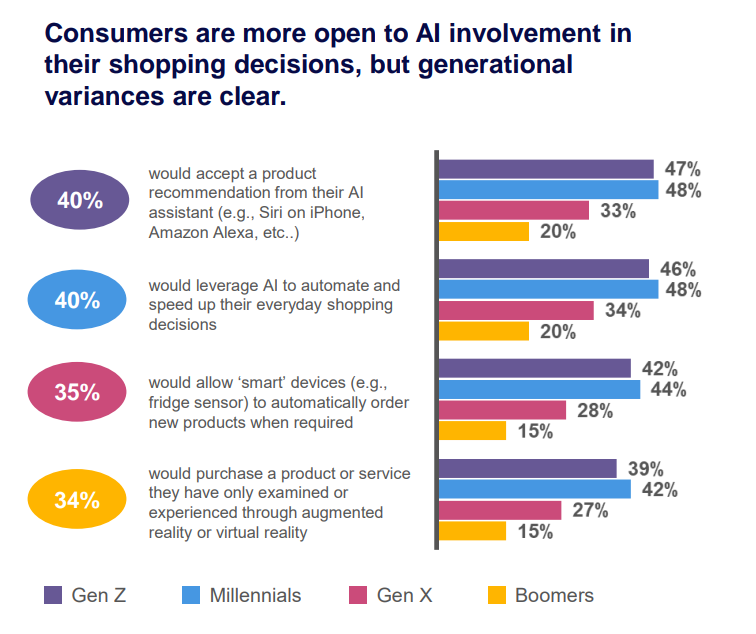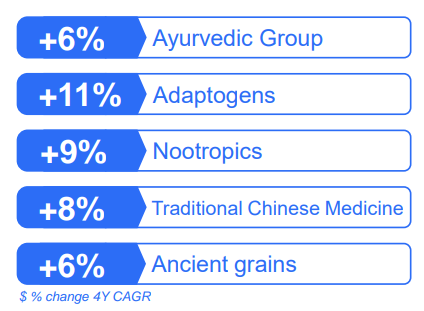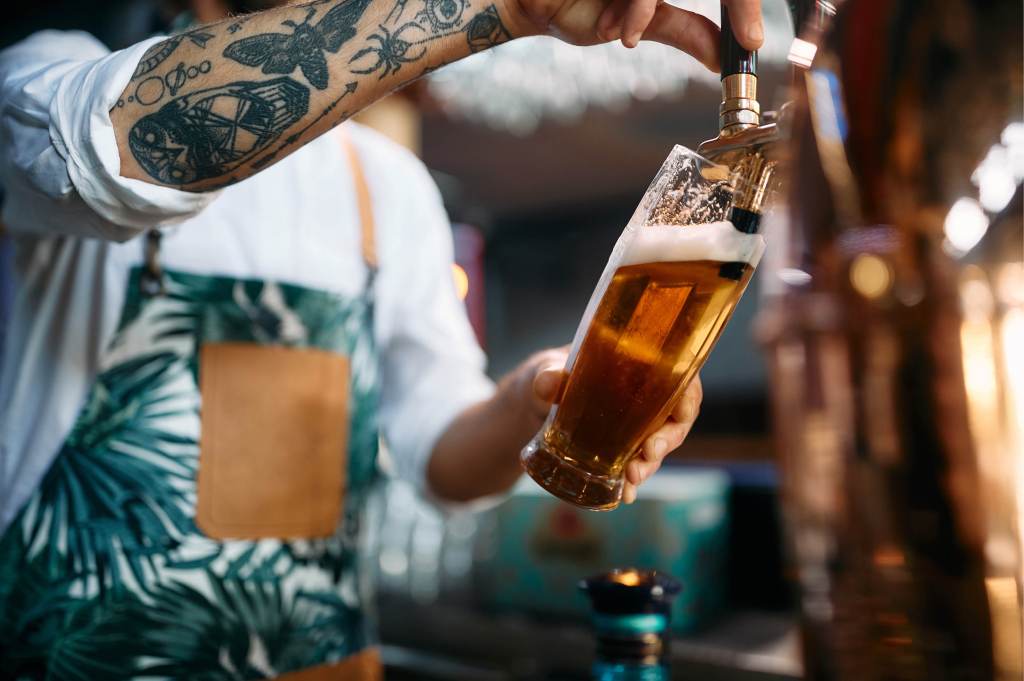This trend reflects a deeper understanding of mental health as an essential component of overall wellness. As conversations around mental health become more mainstream, consumers are demanding more than quick fixes. They want tools and solutions that are transparent, effective, and personalized to their unique needs. This presents an incredible opportunity for brands to not only meet these demands but also become trusted allies in a rapidly evolving wellness landscape.
In this article, we’ll explore the key trends shaping mental health in 2025, from the rise of functional ingredients and AI-driven solutions to generational perspectives and growing consumer skepticism.
The State of Mental Health in 2025
The growing emphasis on mental health in 2025 reflects a transformative shift in how consumers prioritize their well-being. Mental wellness is no longer confined to reactive solutions but is embraced as an integral part of daily life, influencing everything from purchasing decisions to lifestyle habits. This evolution is particularly evident across generational lines: Gen Z leads the charge with a strong preference for innovative tools and practices, Millennials and Gen X focus on balancing mental health alongside their busy lives, and Boomers increasingly seek solutions to enhance emotional resilience and manage aging-related stressors.
As mental health becomes a more mainstream concern, attitudes toward treatment and wellness are shifting. Consumers are embracing holistic health practices that integrate physical and emotional well-being while demanding greater transparency from brands. Trust has become a critical factor, with 57% of consumers expressing concerns about financial incentives driving healthcare recommendations.2 This skepticism has led to a preference for brands offering clear, evidence-based claims about the benefits of their mental health products and services.
MRI Simmons women research
- Mental Well-Being: 65% frequently seek products or services to improve their mental well-being, a 33% increase from 2022.
- Mental Health Importance: 94% believe that taking care of mental health is crucial for overall wellness, up 46% from 2022.
Despite these advancements, challenges in access and equity persist. Income disparities continue to limit access to quality mental health care, creating opportunities for brands to offer affordable and inclusive solutions. Furthermore, while younger generations are eager to adopt innovative tools, older demographics may approach new solutions with caution, requiring thoughtful education and messaging. By addressing these challenges and embracing transparency, inclusivity, and innovation, brands can establish themselves as trusted partners in promoting mental well-being in 2025 and beyond.
Key Drivers of Mental Health Innovation
Innovation in mental health is accelerating at an unprecedented pace, driven by advancements in technology, evolving consumer expectations, and a growing focus on holistic wellness. In 2025, brands and industries are reimagining how mental well-being is supported, moving beyond traditional methods to offer personalized, accessible, and proactive solutions.
With that in mind, here are 3 key drivers of mental health innovation:
1. Technological Advancements
Technological advancements are playing a pivotal role in reshaping mental health support, offering consumers innovative tools to manage their well-being. AI-driven solutions are at the forefront, enabling personalized wellness experiences that cater to individual needs. For instance, the adoption of smart devices and virtual assistants is on the rise, with 40% of consumers willing to accept product recommendations from AI and 34% leveraging AI to automate daily decisions.3 These technologies simplify mental health management by integrating it seamlessly into everyday life, whether through reminders for mindfulness practices, emotional check-ins, or curated product suggestions that promote relaxation and stress relief.

Another exciting development is the rise of wearable and smart health gadgets, which empower consumers to track and improve their mental and physical wellness. Devices like the Amazfit V1tal, which logs nutritional information automatically, and the MULLI AI Dermascope for skincare, demonstrate the potential for technology to provide comprehensive wellness solutions. Though primarily focused on physical health, these innovations highlight the expanding capabilities of technology to address mental health holistically, fostering a deeper connection between emotional well-being and physical care. As these tools become more sophisticated, they are set to transform how consumers approach mental health in 2025.
2. Ingredient Trends
Ingredient trends in 2025 reflect a growing consumer focus on products that support mental well-being through natural, functional, and transparent formulations. Nootropics (+9%) and adaptogens (+11%) have gained significant traction as consumers seek solutions to manage stress, improve focus, and enhance mood.4 Ingredients like ashwagandha and magnesium, known for their calming and stress-relieving properties, are becoming staples in functional foods, beverages, and supplements. Additionally, attributes such as “clean label” and “free from” claims—free from artificial colors, preservatives, and other additives—are increasingly prioritized, highlighting the demand for transparency and natural ingredients in mental health products.

The intersection of mental health and nutrition is also driving growth in nutrient-dense products that support overall well-being. For instance, items labeled as containing antioxidants, excellent sources of protein, and nutrient-packed formulations are seeing increased consumer interest. Emerging dietary preferences like paleo, plant-based, and gluten-free are also gaining momentum, aligning with a broader desire for clean and functional eating. These ingredient trends demonstrate the evolving consumer preference for products that not only deliver on health claims but also align with their values of sustainability and natural wellness. This shift presents an opportunity for brands to innovate and differentiate their offerings in the wellness market.
3. Cultural and Societal Shifts
Cultural and social shifts are driving a new era of mental health awareness, influencing how consumers engage with wellness solutions. As mental well-being becomes more integrated into everyday life, consumers are seeking products that align with their values and lifestyle priorities. This shift is particularly evident in the workplace, where mental health programs and employee wellness initiatives are gaining traction. With 94% of consumers acknowledging mental health as a critical component of overall well-being, brands have an opportunity to support this movement by offering products and services that promote relaxation, stress management, and emotional resilience.1 The increased focus on mental health is also fueling the demand for transparency, underscoring the need for brands to build trust through clear, evidence-based claims and ethical marketing.
Social commerce and digital engagement are also reshaping how consumers access mental health-related products and information. With 55% of consumers making purchases directly through social media and live-stream platforms, the time from discovery to purchase has been drastically reduced.5 This presents an opportunity for brands to educate and engage consumers in real time, offering expert insights, product demonstrations, and community-driven content focused on mental well-being. As these cultural and social dynamics evolve, brands that align with consumer expectations for accessibility, transparency, and digital engagement will be well-positioned to lead in the mental health space.
5. Digital Engagement & the Influence of AI
Digital engagement is revolutionizing the Beverage industry, reshaping how consumers discover, interact with, and purchase their favorite brands. Social media platforms like Instagram, TikTok, and Pinterest are leading this transformation, serving as hubs for inspiration, education, and commerce.
Artificial intelligence (AI) is further enhancing digital engagement by enabling brands to deliver tailored experiences and predictive insights. AI-powered tools can analyze consumer preferences, recommend products, and optimize marketing strategies in real-time, helping brands stay ahead of rapidly shifting trends. Additionally, AI algorithms can identify emerging flavor preferences and buying behaviors, guiding product innovation and inventory planning. By integrating AI into their digital strategies, Beverage brands can not only meet but exceed consumer expectations, creating more meaningful and efficient engagement across the omnichannel landscape.
Opportunities for Brands
As mental health takes center stage in consumer wellness, brands have a unique opportunity to develop products that directly address emotional well-being. Functional foods, beverages, and supplements designed to support stress relief, cognitive function, and relaxation are gaining traction. Ingredients like nootropics, adaptogens, and antioxidants are seeing increased demand, particularly as consumers seek natural solutions to manage their mental health. Additionally, clean-label products with attributes such as “free from artificial colors and preservatives” and “excellent source of protein” are becoming more desirable. Brands that invest in product innovation, leveraging these trends, can differentiate themselves in an increasingly competitive wellness market.
Beyond product development, brands can drive engagement through education and advocacy. Consumers are more wellness-empowered than ever but also increasingly skeptical, with concerns about misleading claims and financial incentives in healthcare. Providing clear, evidence-based information about product benefits and mental health solutions can help build trust. Hosting webinars, publishing research-backed content, and partnering with credible health experts can reinforce a brand’s authority in the space. Additionally, initiatives that support mental well-being—such as workplace wellness programs or partnerships with mental health organizations—can further enhance brand credibility and deepen consumer loyalty.
Community-building presents another key opportunity, as social commerce and digital engagement reshape how consumers interact with mental health-focused brands. With 55% of consumers making purchases directly through social media and live-stream platforms, brands can create real-time, interactive experiences to educate and connect with their audience. Features like expert-led live Q&As, behind-the-scenes product development insights, and peer-driven testimonials can foster deeper engagement. Additionally, the growing popularity of private-label wellness products suggests that consumers are prioritizing accessibility and affordability. By offering transparent, high-quality solutions at various price points, brands can cater to a broader audience while reinforcing their commitment to making mental wellness more inclusive and accessible.
Make 2025 Better For Your Brand with NIQ
Understanding the state of the current market, your position in it, and evolving trends hinges on your ability to access up-to-date and accurate data. NielsenIQ tracks 1,000+ attributes across total store and 250+ NielsenIQ-only attributes and can get granular with Product and Label Insights.
Learn more about our Health & Wellness offerings and sign up for a demo to see product attribute data in action. Or watch the What’s Next in Wellness webinar with NIQ’s Sherry Frey for even more insights into the state of Wellness in 2025 and beyond.
Sources:
1 – MRI Simmons
2 – NIQ MRI Simmons Consumer Study Fall 2024 and Trending Topics 2024 Q4 studies
3 – NIQ Mid-Year Consumer Outlook: Guide to 2025
4 – MRI Simmons MRI-Simmons 2024 Fall Study and the Alternative Medical Care is sourced: MRI-Simmons 2024 Q4 Trending Topics Study
5 – NielsenIQ eCommerce Panel, Latest 3 years ending November 2024




